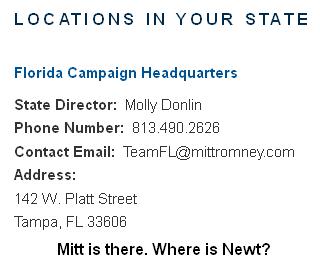 Newt Gingrich’s clear come-from-behind victory in the January 21 South Carolina primary has made the Republican Presidential Primary a lot more exciting than it looked after Iowa and New Hampshire.
Newt Gingrich’s clear come-from-behind victory in the January 21 South Carolina primary has made the Republican Presidential Primary a lot more exciting than it looked after Iowa and New Hampshire.
Clearly, many Republicans remain reluctant to embrace Romney. If the opposition coalesce around Gingrich, the not-Romney of the moment, the party is in for a long grind of a primary.
One question right now is whether Gingrich has the organization to make the most of his momentum.
Florida, January 31, is the first test. Romney has been ahead in the polls there lately, but his support is eroding and as recently as December, Gingrich had a solid lead. The political climate in the sunshine state can be fickle and is prone to dramatic changes. It serves one well to be well prepared.
In South Carolina, Gingrich was able to build on his strong debate performances, “earned media”, i.e. news coverage playing up alternatives to the front-runner, and the self-reinforcing momentum generated as more and more people came to see him as the most credible challenger to rally a plurality of the non-Romney vote around him. If Santorum drops out now or his supporters begin to think that a vote for him is a vote wasted, Gingrich has the potential to be a considerable challenge for Romney.
But “the Mitt” seems better equipped for the tough grind ahead. While he continues to have a “base problem”, he does better than anyone else in hypothetical match-ups against President Obama, lending credence to his argument he is best positioned to do well in the November general election.
Romney also has a much stronger operation in place to fight for the margins in every upcoming state. Consider just money, organization, and organized support–
Money. A long multi-state primary is expensive. Romney has raised much more money than Gingrich. In the last quarter of 2011, he raised $24 million, compared to Gingrich’s $9 million.
Organization. A long multi-state primary is also complicated to coordinate and involves a lot of hard work on the ground. Romney has his organization, data infrastructure, web presence etc in place nationally. He is very active in states like Florida, where his campaign has been working for months, both on the air and on the ground (Gingrich opened his office there January 13). Romney also already has an office in Nevada (caucuses February 4). It is not clear that the Gingrich campaign has any real presence there. In December, a local operative working with his campaign told the Las Vegas Review-Journal that there were no immediate plans to open an office in the state. (That is bound to change after his South Carolina win.)
Organized support. A long multi-state primary is not something you want to fight on your own. Romney is not only racking up endorsements, fundraising contacts, inside advice etc from establishment Republicans afraid Gingrich just might win and wreck the party in the process. He also enjoys greater Super PAC/ “outside” support. Even after Sheldon Adelson’s headline-grabbing $5 million donation to the pro-Gingrich-though-in-no-way-coordinating-with-his-campaign “Winning Our Future” super PAC, Romney continues to enjoy more support. The pro-Romney group “Restore Our Future,” run by two key staffers from his 2008 campaign, has spent more than double the amount of “Winning our Future” so far. It will provide a handy vehicle for people keen to stop Gingrich but reluctant to back Romney directly.
Where does that leave Gingrich? Can he build on yesterday’s result? Here is what Mac Stipanovich, a GOP strategist in Florida, had to say to the LA Times:
“Romney has worked the state continuously, one way or another, for the last six years. … Gingrich lacks both the organization and the financial resources to capitalize on a win in South Carolina.”
That may just be true of the February states Nevada, Colorado, Arizona, and Michigan too.
Good organization does not guarantee victory, but it sure helps. If Gingrich is to compete in the long run, he and his supporters need to build a stronger and more resourceful campaign now to capitalize on the anti-Romney sentiment. Otherwise, “the Mitt” will grind them down.
My book, Ground Wars: Personalized Communication in Political Campaigns, deals with how American political campaigns mobilize, organize, and target their field operations, using large numbers of volunteers and paid part-timer workers to contact voters at home at the door or over the phone. It will be published in February 2012 by Princeton University Press and is available for pre-order on Amazon.
(cross-posted on rasmuskleisnielsen.net)








2 Comments